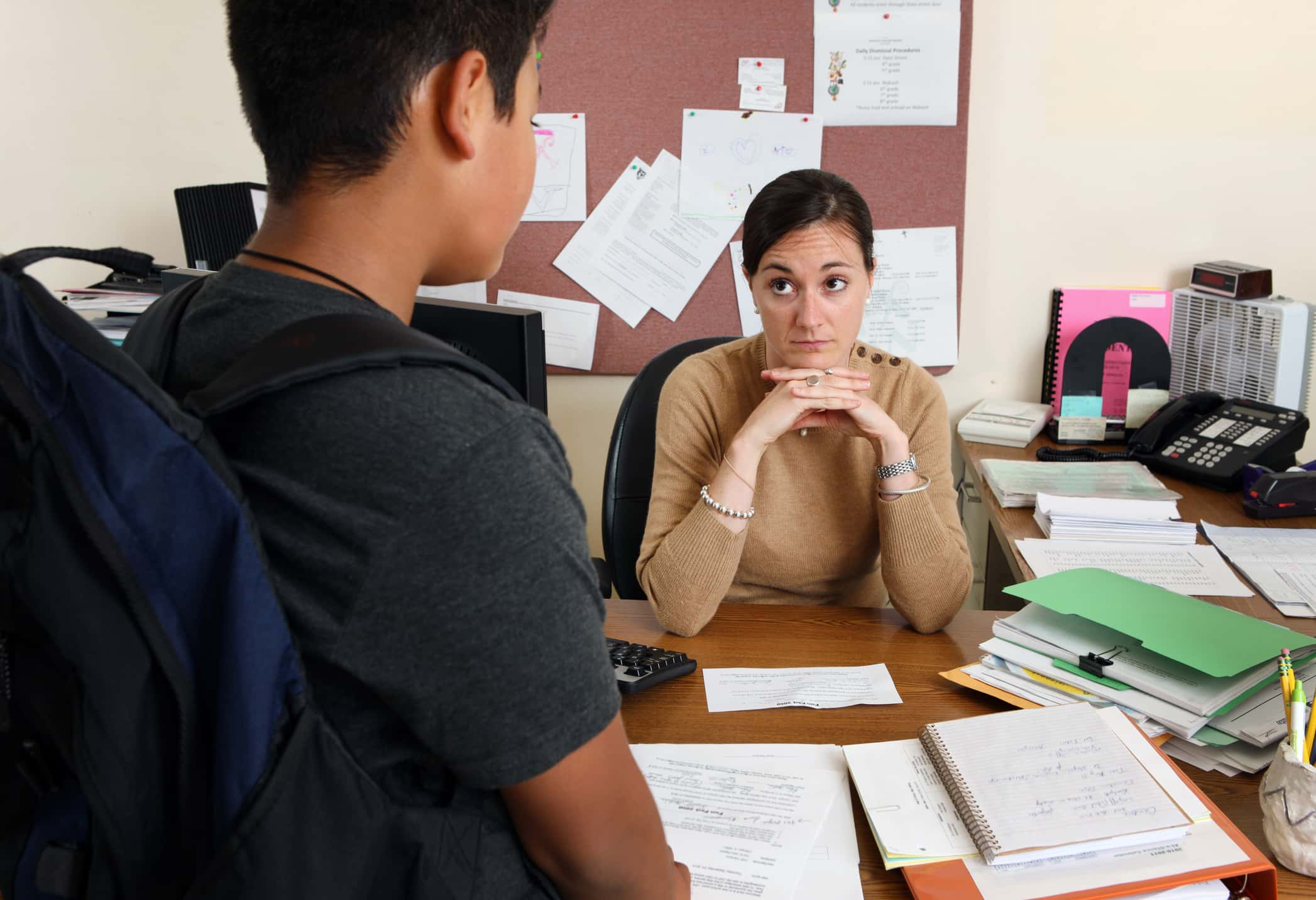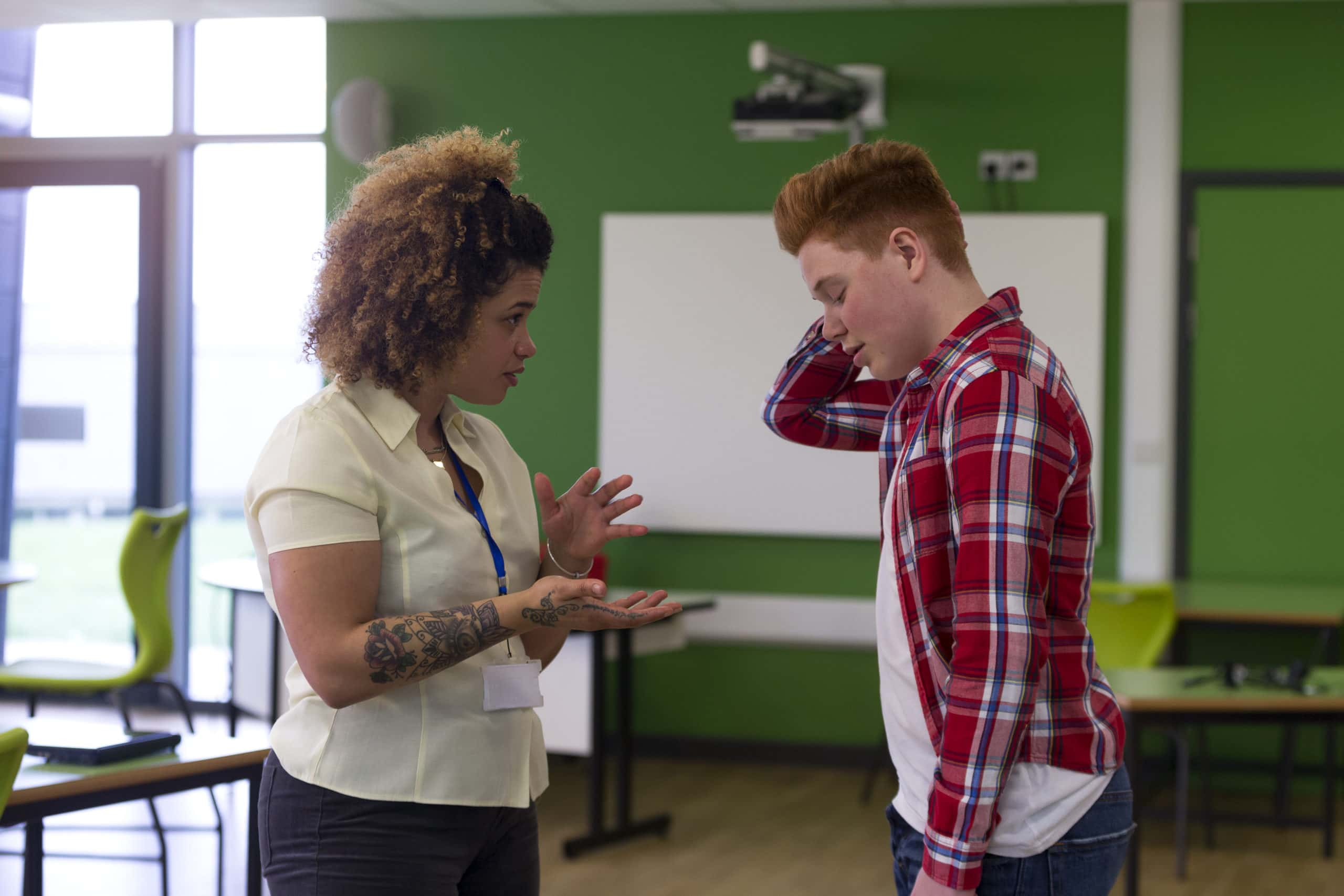Anything can happen during a parent-teacher interview. Everything a student has ever done in class is laid out in the open for his or her parents, putting that "good boy" or "good girl" image at risk. Here are some of the most unforgettable parent-teacher interviews ever:
1. Pulling On My Heart Strings
During my initial year of teaching at a primary school, a dad brought in his slightly shy yet incredibly intelligent and diligent son. The boy had started below his grade but had managed to catch up through hard work. The dad had consumed alcohol, as his unsteady movements and slurred speech indicated. I requested backup from the office immediately.
We guided him to the office where he started vomiting in the garbage bin. I noticed an overwhelming emotion of embarrassment, anger, and sorrow from his son. I had additional parent meetings lined up and couldn't linger around, but the school had to get in touch with the authorities. And that wasn't the most disturbing part.
The following day, his son came in and apologized. Pausing, I told him I was proud of him, and I was sorry about his dad's situation. This seemed to mildly uplift him. I forwarded his progress report and some of his outstanding work samples home. Although I attempted to reschedule the ruined meeting, it didn't materialize. What truly saddened me was when he asked me if he could stay with me over the holidays.
I reassured him that his family would miss him too much, and his response was simple, "No they won't". He switched to a different school the next year.
2. You’re Grounded!
During my initial year as a teacher, I encountered a mother who seemed to brush off everything I said, often assuming the worst. I began with a compliment, saying "Hi, your daughter has been doing remarkably well in class this term". However, her response surprised me; she snapped, "I hardly believe that. She isn't capable of achieving much!” Even when I provided evidence of her daughter's success, she waved it off, declaring that her daughter would never measure up to her siblings.
Next, I suggested ways for her daughter to further improve her already substantial grade. But the mother retorted, “That settles it—I'll make her stay home for a month as punishment!” Each subsequent comment I made after that led to her adding another month to her daughter's “punishment time". In the end, I hurried to wrap up the meeting in an attempt to spare her daughter from spending the rest of her days grounded!
3. Language Barriers
I contacted the parents because their eighth-grade child was teasing another student. I noticed the instigator tossing gum at a classmate who was wheelchair-bound. When the child's father came to school, we found out that he only spoke Spanish. Fortunately, the Cape Verdean math teacher was proficient enough in Spanish to translate, so we organized a meeting consisting of me, the math teacher, the child's father, and the child himself.
In the middle of the meeting, the father said something in Spanish. The math teacher translated it as: "He's expressing his admiration for your dedication and..." However, the child abruptly cut him off, correcting, "No, that's wrong! He's saying you're dishonest!" Suddenly, the meeting took a twist as the father’s expression turned sour, making us all uneasy. He angrily voiced something in Spanish before standing up abruptly, causing the table to shake.
I turned to the math teacher, asking him to translate the father's last words. But he said, "I don't know what he said."
4. Don’t Bite Your Thumb
So I was trying to explain Romeo and Juliet to a class of learners who were finding the material pretty challenging. I was discussing the scene where the line "I shall bite my thumb at them" is seen as a real put down. One of my students didn't grasp the concept of an insult, so without thinking too much, I said, "Well, it's when you say something unkind about somebody. Like, if I said your mom had a bad smell, that would count as an insult."
Well, this kid didn't take this example very well and left the classroom pretty upset. I quickly caught up with him and apologized, explaining it was just a hypothetical example, not a personal attack. He seemed to grasp this eventually.
However, the following day, his dad turned up at the school, absolutely steaming. He was incredibly angry because he thought I'd been disrespecting his wife during my teaching. To say he was up in arms would be an understatement.
I patiently reiterated that it was merely an illustrative example, and I wasn't making any statements about his spouse...but his rebuttal was, "Never mind that! What if my wife does have a bad odor?” At that moment, to say it was hard for me to keep a straight face would be an understatement and the rest of our interaction is a haze in my memory. Somehow, I managed to calm him down, but the experience was so memorable, I'll never forget as long as I live.
5. Judging Books by Their Covers
I once had a parents' meeting with the dad of one of my pupils. Now, he had a bit of a reputation for being from a tough neighborhood. I'll admit, I was a smidge apprehensive, not really knowing what was in store for me. He showed up armed with an impressive full-body tattoo, including several tear marks on his face from his time in jail, which made him look quite daunting. But he caught me off guard with what happened next.
I held onto my best "teacher face" and interacted with him just like I would with any other parent. In the end, we had a terrific conversation. I was relieved his child was a good student, which meant no dreadful news to deliver. Surprisingly, he turned into one of the most involved parents, participating in every school activity and session we conducted throughout the year.
Over time, I ended up teaching each of his three children during my years as a kindergarten teacher. He was consistently respectful, even helping me out in the parking lot when I had a flat tire. What stood out the most was not only the reminder to "never judge a book by its cover," but also the fact that he asked me for parenting advice to steer his kids away from the path he'd traveled (his words).
I believe he just needed someone willing to really listen. Currently, two of his children attend high school and are thriving in AP classes, with college in their sights. The youngest is also doing well in middle school. That single parents' meeting taught me a valuable lesson about people and my role as a teacher, one that I'll always remember.
6. Stay Positive
A number of years back, during a parent-teacher meeting, a dad blindsided his sixth-grade girl with the news of him planning to return her to foster care. This came as a shock, especially since he had invested years trying to gain custody from her mother (who was jailed for various crimes).
Following his successful custody battle, the father had remarried, but his relationship with his daughter instantly soured. Particularly, the girl and her stepmother didn't get along at all. Throughout the meet-and-greet, the father tried to devalue every positive comment I had about her progress. For instance, when I spoke about her improvement in math, his response was, "Sure, you're doing better in math, but you still never listen to what your stepmother has to say."
After several instances of such comments, I felt a sense of desperation swelling. Then, the father landed the final blow, saying, "I cannot allow you to split my family. Therefore, in June, I will ask the judge to put you back in foster care." Both the girl and I were completely taken aback. Her fiery reaction to her dad's remarks instantly turned into a deflated demeanor.
Though I struggled, I tried to give a positive spin to the situation. I said, "Well, you've made such tremendous progress recently. Let's discuss what helped trigger this improvement so we can maintain these positives regardless of future circumstances." But, honestly, I was speechless. The rest of the meeting was primarily me attempting to keep the mood up.
When I could see no other way to salvage the situation, I thanked them for coming and brought the meeting to a close. This happened near the end of the school year, and she did not return for the last week, nor did she continue at our school afterward. I have since wondered what might have become of her and hope that she is doing well.
7. Nobody Puts A Teacher In A Corner
A parent dropped in unannounced for a "discussion" once. It must have been around lunch break because I was alone in my room. His son was having trouble keeping up with classes, and he was clearly worried about it. As I was going over the list of assignments his son had missed, the father became increasingly stressed. He was agitated and loud, although not angry exactly, his hands mirroring his rising tones.
I was caught off guard, as I'd been in the middle of packing things into a closet when he approached me. Before I knew it, he had me pseudo-trapped in the closet corner, talking forcefully (not outright yelling) and gesturing animatedly in front of me. I'm quite tall, about six feet, but he was even taller, upset, and invading my personal space. He was unintentionally blocking me from getting out.
I was so taken aback that my composure slipped, and I couldn't manage to regain control of the situation. It wasn't that I felt directly threatened, but more like a deer caught in the headlights, frozen in place as I saw a potential crisis unfolding yet unable to avert it. Sadly, my instincts were right. When another student wandered in during school hours, saw the predicament, and quickly retreated, I initially assumed it looked suspicious like some unconventional classroom activity was going on (there goes my job). But, thankfully, the student fetched other staff members.
When my fellow staff came in and interrupted, the father immediately backed off. As soon as that happened, it seemed like he snapped back to reality, recognising how intimidating his behaviour had been.
I don't think his reaction had much to do with me personally. He was just overwhelmed by the circumstances and genuinely wanted his (special needs) son to succeed. It seemed that stepping back from the situation helped him see his actions more objectively, and he was clearly regretful. After that, I didn't cross paths with him again, and his son ended up switching schools a couple of months later.
8. Monkey See, Monkey Do
After school, I look after children at a school. Recently, I had to inform a mom that her junior kindergarten girl had lost her temper, and made a startling statement to her classmates. She had said, "I'm going to find a weapon and harm everyone!" This outburst was caused by her older sister, who is just a year ahead in kindergarten. Her sibling had been subtly and cleverly provoking her, such as giving accolades to everyone else, yet ignoring her.
The younger child took inspiration for her threat from the elder one, who had expressed similar ideas previously out of amusement. The look on their mother's face was heartbreaking—especially when she realized that it was her youngest we were discussing. Both sisters are impressively bright and articulate, but the younger girl had never shown such behavior before.
9. High Expectations
The parents of a student I had, who lives with severe autism, asked me about his school performance. They wanted to know his areas of improvement and where they could provide additional support. They were also curious about his projected progress by the end of the academic year, which I found pertinent to my lesson planning. However, the conversation switched when they began discussing their rather ambitious long-term goals, like having their son attend medical school one day to eventually support the family.
It's not unusual for parents of children with special needs to harbor lofty aspirations, typically centered around some unattainable level of self-reliance. Most come to realize and accept this by the time their children reach late adolescence. The reality is this: their children will always need assistance. Despite being in his 20s and barely having a minimum vocabulary, these parents continued to hold onto unrealistic expectations for their son.
To give some context, his vocabulary consists of words like "yes,” "no,” "mom,” "dad,” "bathroom,” and the names of a few of his toys. Despite receiving a high school diploma, any college advisor would agree that his learning journey while working by himself didn't exceed a kindergarten level.
I speculate that cultural expectations are to blame. Both parents, successful physicians with numerous degrees from India, held the cultural belief that their son should take care of them in their old age. They knew autism wasn't temporary, but failed to accept its permanence.
Should their son secure a job in a sheltered workshop, it would honestly be a significant achievement. It could take endless hours of training to get him to independently complete a simple two-part assembly task just once. Imagine the effort required for him to repeat it on a four-hour shift without constant aid.
This was the vision I saw unfolding when they discussed visions of their son conducting medical research. The statement that echoed in my head was, "He's so detail oriented, we think he would be best as a surgeon". It was an overwhelming moment, yet I stayed composed. As of now, their son is in a work program, that's facing challenges.
Over the years, the mother has started accepting the stark reality, though the father continues to cling on to their lofty goals. The parents, ever so kind, send me Christmas cards annually and meet me for monthly coffee chats. They often bring gifts and express interest in my professional accomplishments and the strides I've made with other students. Their son sometimes tags along and sometimes recognizes me, asking for his treasured "blue marker”– or as he calls it, the "broom hen". As they light up when he says this, I'm starting to understand how even the smallest victories, like remembering who gave him his beloved marker, could lead them to lose touch with reality.
That shouldn't be a surprise; it's so typically them.

History's most fascinating stories and darkest secrets, delivered to your inbox daily.
10. More Homework, Please
During my student teaching stint, I found myself alone for an evening of parent-teacher meetings, without my mentor to guide me. A mature Bosnian lady walked in and launched into a heated accusation. She was convinced that her son never received homework from me, implying that I was avoiding work myself.
It was quite a challenge to keep composed. Contrary to her claim, her son was in an accelerated program and not among the top performers. I did assign him homework, but he just pretended to complete it when he didn't. I feel at some point, the responsibility lies with the parent to inquire, "Do you have any homework?", rather than expecting the teacher to oversee the child's duties at home.
But in this case, I reassured her that I would discuss the situation with her son the next day and devise a plan for extra credit work to help improve his grade.
11. Needs Some Help
We recently sat down with a mother whose child has been diagnosed with severe ADHD. The child finds it a challenge to stay seated for even three seconds. We were curious about why he wasn't being treated with medication, given the significant impact this was having on his learning. In response, the mom became visibly upset and shared her traumatic past and her experiences in a mental institution. The details she shared were deeply concerning.
She revealed that during her time in a state-run facility, she was treated much like a guinea pig, subjected to all sorts of experiments. This left her often feeling like a zombie. Since the child's father is serving a life sentence, child protective services were overseeing their welfare. The mother clearly stated that due to her own unpleasant experiences with medication, she refuses to consider medication for her son.
He seems to run wild in school, often causing harm to other kids, and our hands seem tied.
12. Just Listen
My friend is a teaching assistant who works with disabled students in a K-12 school setting. Right now, she supports a group of six deaf middle school boys and aids their sign language translator. One day, she came to me in tears recounting a distressing experience she had just had during a parent/teacher meeting with one of the boy's interpreters.
The boy's father adamantly denies his son's deafness, insisting that his son can hear loud noises. The man dominated the meeting by vociferously accusing the teacher of squandering the district's money on an unnecessary sign language interpreter. He vehemently believed his son was pretending to be deaf. To illustrate his point, the father loudly dropped a few books on the floor, causing his son to react.
He then said something utterly shocking: "See? He's merely seeking attention. He's played this act for years. It's about time he pulls himself together and behaves responsibly, like a man". Despite the teacher, experienced interpreter, and district representative presenting audiologist tests confirming his son has been deaf since age two, the father remained defiant and unwilling to listen.
13. Practice Makes Perfect
Hey there, I'm a guitar tutor. For a while, I had this 10 or 11-year-old student who, despite my best efforts, would not practice at home. It seemed like I was constantly going over the basics—from how to hold the guitar to simple chords. I kept repeating, "Daily practice is a must, just a few minutes can make a huge difference," but to no avail.
I didn't really have contact with the parents; they preferred to just drop off and pick up the kid from the parking lot. One day, however, his dad came storming into my studio, fuming. He confronted me saying, "I'm not throwing my money away for a class where my son isn't improving. What are you teaching him?" Maintaining my composure, I replied, "One major thing I'm teaching him is the importance of daily practice."
This seemed to throw the dad off. He looked at his son, then back at me, puzzled. "Daily practice, really?" "Yes," I confirmed, "Preferably for at least 30 minutes." At this point, his dad started getting agitated again. "So, what should he be practicing?" I answered simply, "Have him show you his music sheets."
The kid, realizing he'd been caught in his lie, barely made eye contact as he reluctantly revealed his untouched music sheets. The father was visibly taken aback, either by his own naivety about musical education or by his son's deceit.
This father and son duo never showed up again, which was a relief since our sessions were quite unproductive due to lack of home practice. I've had similar encounters with other parents getting upset for the same reasons, though none were as confrontational. It's essential to remember that music classes are only effective when practice is done daily. Without it, your child won't see much improvement.
14. Natural Artist
In my previous profession as a teacher, I often interacted with a lot of different parents, some good and some bad. Years ago, during parent-teacher conferences at the middle school where I taught, we would present parents with folders of their child's work that were collected from various teachers.
Inside one of these folders was the work of a student who was generally quiet and had trouble staying focused, allowing his mind to wander frequently. Despite this, he wasn't a particularly troublesome student. The folder contained a science test he'd botched due to careless mistakes. His father attentively took the time to review each wrong answer with his child.
Upon observing this, I thought to myself, "Impressive, a parent deeply involved in his child's studies. Good job, Dad!" However, things soon took a drastic turn. We turned to the next piece of work, a completed language arts assignment with a commendable 85% score. Yet, it was adorned with intricate doodles done by the student. The sketches were actually quite gorgeous.
Upon noticing the drawings, the father immediately reacted in rage, slapping his son so forcefully that it gave the child a bloody nose. He started yelling at his son, threatening severe consequences if he ever caught his son doodling again, dubbing the sketches as a cause of distraction from his studies.
My attempt to pacify the father by suggesting enrolling his son into art classes for honing his skills was met with hostility. He almost physically confronted me, berating me for my suggestions and questioning my qualifications.
As a first-year teacher, I was taken aback by this unexpected outburst. My main prerogative was the safety of the child, so amidst all the commotion, I led the scared and tearful kid to the main office. The father tried to intervene but my stern warning dissuaded him.
15. Letting Off Some Steam
Once upon a time, when I was a preschool teacher, the parent-teacher conferences would always put me on edge, making my entire week feel cumbersome. After one particularly grueling Wednesday, I thought a bit of dancing at a popular club I occasionally visit would help me relax. So there I was, dressed in a slightly bold outfit, sipping on drinks and dancing rather intimately with the guys in the club. Just a harmless night out, or so I thought.
My eyes latched onto a particular guy, and we ended up sharing a passionate moment together. We chatted and I eventually suggested he should come over to my place. But he was a true gentleman—he was open about the fact that he was in an open marriage. His wife was understanding about him dating others, but he had no intention of replacing her or becoming too attached.
Even so, our conversation continued deep into the night and we said our goodbyes on a positive note. Imagine my surprise the next evening at a parent-teacher conference for one of my newer students. I'd met her mother a few times during pickup, but when the man I'd been locked in a passionate embrace with the previous night walked in, it felt like the ground was pulled from under my feet.
This led to the most cringe-worthy parent-teacher meeting I've ever had. Coming face-to-face with a father who knows my deep dark secret can still send shivers down my spine.
16. Not a Matchmaker
One of my most awkward parent-teacher conferences happened when a dad spent nearly half an hour lamenting about his failing love life. He shared his struggles of finding the perfect match via numerous online dating platforms, from Match, to eHarmony, and even OkCupid. He then rather boldly told me that he was looking for a woman who his daughter would like, and suggested I would be the perfect fit.
Attempting to diffuse the situation, I jokingly responded—and it got awkward quick. "Oh dear, I think I might be a tad too young for you!" Considering he's in his 50s, and I'm only 22. Unfazed, he kept on staring, smacked his lips, and eventually left a short while later. Quite an experience!
17. Predicting the Future
My wife started her teaching career fresh out of university at a small-town primary school in western New York. When it was time for parent-teacher meetings, those for children struggling particularly stood out. The last appointment that evening was with a third-grade boy's parents who both showed up for the meeting.
The mother kept a firm hold on her bag, constantly looked at her shoes, and stayed silent. The father, significantly overweight and seemingly smelling of alcohol, was laid back initially. As my wife explained their son's atypical classroom behavior—behaving like an infant, sprawling on the floor, and resorting to loud baby-like gibberish for attention—the father blew his top. He leveled accusations at my wife, saying she was bitter and uninformed.
With that, my wife cut the meeting short. The encounter didn't end there though. As the three exited the school together, the door shut and auto-locked behind them. To my wife's surprise, theirs were the only cars in the desolate parking lot. In the cold, dark air, they silently parted ways.
On her drive home, my wife couldn't help but think: those people have serious problems. Fast forward six months and my wife was watching TV one evening. The news reported on a man arrested for assaulting his children's nanny. As the camera zoomed on a man being handcuffed and pushed into a police car, she recognized him.
It was the same man from the heated parent-teacher meeting. In the background, the third-grade boy stood at the doorstep gazing out fearfully with startled eyes.
18. Just Ask First
A few years back, while I was lecturing a higher-level statistics class, a 27-year-old student's parents decided they wanted a discussion about his course status. To be honest, I wasn't keen on having this meeting at all, but my dean persisted, overcoming all my resistance. So, I ended up sitting down with his mother, who proceeded to grill me with detailed inquiries about previous coursework and the final, diligently jotting down every word.
Here's the intriguing part—she never once mentioned her son, who was, supposedly, a fully grown adult. What was the motive behind our conversation? Towards the end, she even asked me, "How can I achieve an A?" I had to remind her that she wasn't a registered student in the class, so wasn't eligible for grading, at which point I took my leave. I later spoke with her son during the following class, querying him about his latest submitted assignment.
Could she have been doing his coursework? I was left with a torrent of questions. It was obvious he comprehended the subject matter and was profoundly mortified by his mother's meeting with me, offering a string of apologies. Clearly, there was more to this story. The plot thickened on the day final essays were to be submitted when I received email from his mother containing her final for grading. The son also sent his final via the drop box, and their analyses were distinctly different.
It struck me that the mother had been secretly auditing the course. Interestingly, she scored higher on the final than her son. I scored her paper, but more for my own curiosity. If she had been upfront about her interest in the subject and asked to audit the class, I might have agreed. But now, she'll never know.
19. Follow Your Dreams
Before I delve into this story, it's important to note that the "special ed" label now encompasses a wider variety of students. I found myself in a meeting with a counselor, a student from the special ed program, and his mom. Throughout the meeting, this mom kept belittling her son, saying he couldn't achieve as much as his brother did, and scoffing at his passion for video game design. She even went as far as to say it was "not a real job," which made my blood boil.
You see, my background is in video game design and 3D animation. Usually, this student is eager to share his newest game concepts with me, but during this meeting, he just sat there, head downcast, trying to hold back tears. Although I wanted to halt the meeting, the rules wouldn't stand for it. I make sure to review his game ideas daily. His spelling might not be perfect, but that doesn't stop me from being a cheerleader for his creative aspirations.
20. Parent/Teacher Bonding
I once had a meeting with a parent who primarily spoke Spanish, here in the States. My abilities in Spanish are shaky—I comprehend more than I can verbalize. I was apprehensive at first, but things soon improved. I was then pleasantly surprised—her English proficiency was pretty much on par with my Spanish. So, I communicated mostly in English, sprinkled with a bit of Spanish, while she did the opposite. Whenever we stumbled with communication, we fell back on playing a sort of charades, or opted to illustrate our thoughts using paper and pen.
By the time our meeting wrapped up, we were in stitches from laughing, and were quite chummy with each other. Much to my relief, her daughter was faring well. The mother was simply after advice on how she could continue supporting her child. This ended up being the most enjoyable parent conference I've ever had.
21. Bad Comparison
My sister spent a few years teaching at the University of Colorado, Boulder. She encountered students who grumbled about having weekend homework, insisting it messed with their snowboarding plans. However, what really pushed them over the edge was when she announced her engagement and flashed her ring in class.
Unexpectedly, one of her students, who wasn't legally permitted to marry his partner due to his sexual orientation, took issue with this and took his complaint to the department head. My sister then received a completely unjustified reprimand.
22. It’s Just Paper!
Kevin was an all-round fantastic kid. Yet, my own lack of discipline in handling my class made him act out, like the other misbehaving students, throwing a crumpled piece of paper across the room. Soon after the incident, I discussed it with his parents, who made an immediate appearance.
His father, a deeply religious, muscular man, arrived unexpectedly. Kevin was caught off guard when his dad suddenly marched into my classroom, cornered him against the wall, shouted at him, demanding a heartfelt apology. It seemed as if he was on the verge of physically punishing him. Overcome by the situation, Kevin tearfully pleaded for forgiveness. Yet his father's fury only intensified.
Caught in the middle, I found myself hastily accepting Kevin's apology. I then tried to reassure his parents that hurling paper balls wasn't overly serious, pointing out it was common and I confess, occasionally fun. Since this episode, I'm considerably more cautious when reporting minor misdeeds committed by my otherwise well-behaved students.
23. Take Care of Your Things
You see, I'm teaching a bunch of enthusiastic first graders—30 to be precise. Granted, a few have behavioral issues which makes my job, well—a little challenging. So, it didn't help when one of my students came up to me at the end of a long day, upset because she had lost her toy. I assured her I'd look around for it, all the while reminding her to take care of her stuff, especially if it's something she'd miss.
Looking back, I should have handled it differently. The little girl's mother, who also happens to teach at our school, was none too pleased. Imagine the scene—me, standing with 29 kids ready to head home, being asked by a fellow teacher about her daughter's lost toy. 30 minutes later, we're still talking about why it's important not to bring personal items to school that could potentially be lost.
She wanted to take it beyond our mutual understanding, wanting a proper one on one meeting after my class was dismissed. Only to find her, complaining to the principal about the "lost toy" incident. So, we retreated to my classroom, where she spent the next hour accusing me of being heartless and downright awful at my job. She even suggested I should've replaced the toy—a pretty unreasonable expectation.
It's not that simple though, right? To replace every first grader's lost items? I'm a teacher, not a mother. Life’s a lesson. While I'm all for support and care, I also believe in honesty and teaching kids about accountability.
24. How the Chairs Have Turned
My brother was repeatedly getting into hot water for visiting his locker too frequently between classes. Because of this, my parents were invited for a meeting with a group of teachers. The teachers had prepared a semi-circle seating arrangement with six chairs for themselves, surrounding a couple of chairs where my parents were meant to sit. But my dad, with his years of experience as a teacher, wasn't going to play along with this set-up.
As soon as he arrived, he took one of the parental "hot seat" chairs, positioned it in a way that it was facing one of the most critical teachers of my brother. He then sat in it, positioning himself quite closely, almost face to face with the teacher. The meeting proceeded this way. Interestingly, it didn't take long for the meeting to end, and my brother didn't get into trouble again for his locker visits.
25.Who Are You?
We had set aside a half-day for parents to slot in meetings with us teachers, where we'd stick around till eight in the evening, with a quick break squeezed in. During this downtime, I was snug in my classroom, trying to get done with some work and munching a sandwich. Suddenly, this mother walks in, clad in pink yoga pants and a huge parka, looking quite perturbed. Immediately, she begins to apologize for her daughter's behaviour, talking incessantly about her child's shortcomings and lack of help around the house. It was an avalanche of words about her kid's misbehaviour, which was bad enough, but she didn't stop there.
Meanwhile, I stayed mum, just lending a patient ear. Next thing I know, she starts criticizing the curriculum – not constructive feedback, just relentless complaints about her child, the school, and so on – almost treating me like some kind of therapist rather than her child's teacher. She continued to rant about our math syllabus until my next meeting arrived exactly on their scheduled time.
Apologizing, she said, "Thanks for your time", and left in a hurry. I realized that I hadn't uttered a single word throughout the whole encounter. I didn't even know who she was or who her kid was. It was such a strange situation.
26. Cultural Differences
In my initial year as a teacher, I scheduled a discussion with a family from India about their daughter. I praised her intelligence during our meeting, but I also expressed my wish for her to participate more in the class discussions, since she was quite reserved. This is a common suggestion for teachers to make. However, the father's reaction was intense. He grew silent, leaned towards me, and pointed at me accusingly—it felt like a tense moment was about to unfold.
He sternly told me, "My daughter is behaving exactly as she should. This is the expectation for Indian girls. She is a female and it's best if she remains quiet." I immediately stepped back from pushing the matter further. Interestingly, now, after 12 years, this girl and I are friends on Facebook. She has blossomed into an outgoing, sociable, and chatty woman. I haven't encountered another Indian father who has responded like that since then, but the memory of that meeting is firmly etched in my mind.
27. The Origin of Man
When I was a child, my school organized a sort of open house where parents could meet the teachers and take a look at the facilities. It was a Catholic institution located in New Jersey, which balanced a religious foundation with emphasis on learning and education. Our biology classroom proudly displayed the famed Darwin's evolution diagram that transitions from monkeys to cavemen, and finally to humans.
However, one parent was absolutely outraged by this. She reacted rather immaturely, promptly tearing down the poster from the wall in a room full of spectators including the teacher. Almost instantly, a heated argument erupted between the teacher and the disgruntled parent. The teacher noticed the damage to his property, while the parent complained that her son was being exposed to 'evil teachings.'
Until then, I had no idea that such individuals even existed. The situation escalated when the parent pushed the teacher. Before the teacher could react, my dad, a tall, lean but muscular man, grabbed the guy by his shirt and warned, "Stop this now, or you'll be kicked out!" Sadly enough, this intervention led to not just the arguing parent and his son, but also myself and my dad being asked to leave the meeting.
I switched schools soon thereafter, but the incident left an impression on my teachers. From that event onwards, some of them viewed my dad in a negative light.
28. I Would Like to Thank…
One year, I presented a student of mine with an award because he simply made my days better while teaching him. He was smart, pleasant, always willing to learn. Despite having a few behavioral hitches and causing some trouble in other classes, to me, he was fantastic. During the award ceremony, I ran into him and his mother. To my surprise, she sternly directed him towards me and asked why he received this award when she felt he didn't merit it. That was shocking on its own, but she didn't stop there.
She proceeded to scold me for the next ten minutes, berating her own son, diminishing his worth, and asserting that he had must have duped me if I perceived him differently. I've never wanted to take a child under my wing as much as I did in that moment. The encounter moved me to tears on my drive home. He stays in my thoughts frequently and I wish he could've been free from that environment.
29. Don’t Take Things for Granted
My mom works at an elementary school designed for extremely low-income families, also known as a Title-One school. She recently had a parent-teacher conference, and she shared a story about one particular family that truly hit home for us. In this age of digital learning, the school relies heavily on internet-based resources, and sadly, one student didn't have access to a computer.
Nor a phone, internet, more than two sets of clothes, a father, or even a traditional home. A hardworking single mother and her four children, they called their van parked nearby the school, their home. Their only aspiration was to save enough lunch money to buy a small Christmas tree to add some festive cheer to their van. It was a heartbreaking story that reminded me of my own privileges. It made me feel both blessed, and incredibly guilty for taking my circumstances for granted.
30. Bottling It Up
For two years now, I've been mentoring a certain student. He's an exceptional young man—downright sincere, dedicated, and empathetic. However, there's an unsettling spark in his gaze, hinting at some underlying anger. At school, this frustration manifests subtly, with him expressing displeasure in a calmly.
The same can't be said about his behavior at home. At home, he's alarmingly disruptive. He's physically harmed his father to the extent of needing emergency medical aid. He's woken his mother inappropriately during the night. He torments his younger sibling on a daily basis, even resorting to violence that has included pushing her down the stairs. He's even tried to wrest control of their family vehicle, risking their lives whilst on the road.
Frequent parent-teacher meetings are a heartbreaking necessity. In essence, these meetings usually go something like this: "Your son has mastered the art of bottling up his anger while in school, only to unleash it once he's back at home. However, he's so well-behaved while at school, there's no legal basis that would allow me to assist you at home without burdening my school district or myself with the financial responsibility of his therapy. I'm sorry for your circumstances."
31. A Haunting Story
During a parent-teacher conference for a middle school boy, he confessed to feeling constantly tired and struggling to maintain focus. When I asked about his bedtime, it was seemingly reasonable. Then he mumbled something and his parents whispered to him in Spanish. When I inquired what they said, the boy shared an unexpected truth—their house was haunted by a ghost.
The ghost often drove him from his room, depriving him of sleep. His parents confessed they'd been experiencing the same phenomena. Needless to say, my teaching program hadn't prepared me for advising on paranormal problems. When I quizzed them about the ghost, they said it had been there since they moved in, frequently disrupting their rest at night.
They even brought in a psychic who confirmed the ghost's existence. While I'm not particularly religious, knowing they were Catholic, I suggested involving a priest. They agreed to consider it. Feeling somewhat disheartened by the situation, I concluded by recommending that the boy try going to bed an hour earlier.
32. Gimme Shelter
I work at a traditional rural high school located in a highly conservative, Christian, tightly-knit community. I originally hail from the North, and during my first year as a teacher in this Southern place, I accidentally cursed in the middle of a lesson (equally minor and harmless, I assure you). The teenagers didn't seem to bat an eye, they've likely encountered worse.
A week later, a parent from my class requested a conference to discuss his daughter's academic performance. I diligently prepared a progress report and met him during my break in the meeting room. He began our meeting with casual banter about my life in the South, my wellbeing, and his daughter's progress. Little did I know, the conversation was about to take a serious turn.
Soon enough, he steered the conversation towards religion and his family's fondness for the Church. He asked if I attended one, and when I replied negatively, he retorted, "Probably why you resort to crude language in class."
He expressed his very traditional upbringing, his extreme conservative beliefs, and how his daughter shouldn't have to hear harsh words, especially at school. Despite my internal frustration, I apologized for my earlier outburst. The meeting ended, leaving me a little shaken as a rookie teacher.
Two things popped immediately into my mind: Firstly, to make sure I have an administrator with me during all future parent-teacher conferences. Secondly. I couldn't help but think about how sheltered the girl must be by her family—the limitations set on her world.
Cut to two years later, during one of our routine monthly fire drills, things got overturned. A fellow teacher noticed two missing students when they returned to class—one of them was the aforementioned student, and the other, our school's star jock. And when the office learned about this, they discovered them in a compromising position in the parking lot. The irony!
33. He Really Excelled
While I may not be a certified teacher, I've had my fair share of teaching experiences and roles. One time, I recall tutoring a young boy, teaching him the basics of computer usage—everything from Microsoft Word and web browsing, to Excel. To gauge his progress, I'd kick off each lesson with a mini-test on typing speed and computer navigation, though he would generally come up short.
One fateful day, his mother called me in a state of panic and sadness. Amid all the chaos, it took me a moment to figure out what was going on. They were a family of high academic expectations, and her 11-year-old son was distressed about routinely failing these quizzes. She feared they would sabotage his chances of university acceptance.
I was quite puzzled and unsure how the concept of university had come into play. After giving her some space to explain, I discovered a rather peculiar misunderstanding. The boy was under the impression that his insignificant quiz scores would somehow end up on an official document that future universities and employers could access. I couldn't help but crack a laugh. Once composed, I reassured her that this was not the case—I was merely a tutor trying to assess learning progress.
After this clarification, she relayed the message to her son and, no surprises here—his performance skyrocketed. Apparently, the entire saga had just been the result of stress and anxiety. Now, do you want to know who planted the initial idea in his head that I, his tutor, would report his results to universities? None other than his own mother.
34. Bridge to Terabithia
A few years ago, I found myself in an unusual parent meeting. Though the student wasn't actually mine but my teaching partner's, I still attended the meeting. Quick background: Our school had recently got a new principal who quickly implemented a lot of changes. The previous principal had a tendency to bend to the parents' will, given that the school is located in a pretty well-off area.
The new principal wanted our public school to reflect a private school atmosphere. She set about enforcing somewhat peculiar rules, like teachers couldn't bring in gas station coffee cups as it appeared low-brow. We were told to only grab our caffeine from Starbucks, believe it or not. More to the point, the parents were accustomed to having their demands met and did not handle the changes graciously.
Our new principal curbed some of the unnecessary spending which didn't sit well with the parents. As a result, this parent conference turned into a veiled attempt to get back at him, unfortunately putting my teaching partner in a tight spot. The parent's bone of contention was us showing a film during classroom hours.
The film was shown for a couple of reasons. Firstly, our classes had collectively raised a whopping $10,000 for cancer research after sadly, a student lost his mom to the disease and everyone wanted to contribute. This was a way of acknowledging their hard work. Secondly, we had screened 'Bridge to Terabithia' as we had recently completed reading the novel and planned on comparing the two versions.
But the parent felt this constituted wasting valuable class time. She came to the meeting armed with the district's teacher handbook, eager to know exactly how our educational minutes were spent on these films. But what really irked us was her intrusion.
She wanted to know the reasons behind my teaching partner's recent personal leave (which was quite frankly none of her concern). She also complained that due to our "squandering" of school hours showing films, she had to strip her child of his TV time at home to compensate for schoolwork.
Apparently, his only TV time was on Friday evenings, which had to be canceled. What was supposed to be a regular parent-teacher meeting turned into a 90-minute battle where we defended each and every part of our lesson plan. But the parent's real motive was to get our principal into hot water, all because he had stopped financing fancy, custom-made school folders given to parents at the start of the year.
35. Gender Equality
During my first year in high school, I had a teacher who seemed to favor girl students over boys. It was quite common to see girls boasting grades over 100% due to extra credit, while a lot of the boys, including myself, struggled to rise above 40%. The teacher had a policy whereby students scoring below a certain mark couldn't do any extra credit.
No matter how much effort I put in, it had zero effect on improving my grades. So, in an act of rebellion, a few of us boys decided to compete for the lowest average score. This led to my parents discussing the issue with the teacher. I wasn't present, but it appears they accused her of gender-biased discrimination.
Rather than deny it, she claimed she was giving girls extra chances to win, and deliberately setting boys up for failure. Her reasoning? She believed men were excessively privileged in today's society. My mom was shocked—both her parents were educators themselves. The conversation didn't end there; my parents took this issue to higher authorities, including the principal and superintendent.
I don't know the teacher's fate, but my parents decided to withdraw me from that class. Eventually, I scored 100% in that subject during summer school. On my graduation day, I noticed the same teacher was still working there. I assume it might have something to do with the length of her tenure—around 30 years—but that's just a hunch; I'm not familiar with the nuances of school politics.
36. Like a Sore Thumb
In first grade, we all crafted construction paper replicas of our family's car, which the teacher displayed on the classroom wall for a special occasion. It might have seemed odd when I asked for three different shades of construction paper—dark blue, light blue, and grey. My dad was in the process of renovating an old Mustang, which was once painted in light blue.
Over time, the light blue paint had been scraped or peeled off in places, revealing the original dark blue color and patches of grey primer. Excitedly, I created a light blue car, adding haphazard spots of blue and grey on it. I felt a sense of pride in it. Then, the moment of truth arrived. It was parent-teacher night. My parents stepped into the room and the first thing they noticed was the wall adorned with our creations, mine being distinctly different.
Many years later, my mom confessed that she was torn between feeling amused or emotional when she saw my artwork. But as my dad burst out laughing, she followed suit.
37. Ruined Breakfast
Back in the 50s, my great-grandfather was a dean at a university in the Midwest. My grandmother once shared a story about a young lad he had mentored—the first in his family to ever attend college. This student was hardworking but just wasn't made for academia, and he had a tough time keeping up with his classes.
He had to redo multiple classes, and over time his GPA dipped so low it was impossible for him to graduate. My great-grandfather broke this news to him, and the student thanked him for all the help and understanding. On graduation day, something unexpected happened at my grandmother's home during breakfast.
There was a knock on the door. As they opened it, they were taken aback. It was the same student, with his parents who had come to see him graduate. He couldn't muster the courage to let them know he wasn't graduating, so he brought them to my great-grandfather to break the news. As my grandmother put it, "The mother burst into tears. It certainly brought the mood down at breakfast."
38. Transfer Student
There's a kid in my class who suffered a severe brain injury when he was young. Now, in the 9th grade taking Algebra 1, he has a hard time distinguishing between addition and subtraction. On top of that, he's unable to read or write. We had a meeting with his mother where we discussed the idea of moving him into a special needs learning environment, as the regular education program is proving too difficult for him.
Their family originally comes from another country, so we had a translator during our conversation to ensure they fully understood what was being discussed. Their response was heartbreaking—both the mom and the son broke down crying during the meeting. They pleaded with us not to put him in the special program, promising that he would stay late to put in extra effort. Despite it all, they ultimately decided against the change.
The boy is still in my class and he's not making passing grades. The basics of mathematics, like addition and subtraction, continue to baffle him, even after some separate instruction time I've managed to spare. Seeing his mom tearfully implore me to "save her son" was incredibly painful. It's even more so now, watching him struggle and get lost trying to understand concepts that simply don't click with him.
39. Just Hold It
This tale dates back to when I was eight and had a particularly dreadful stand-in teacher at school. One day, when we had our routine spelling test, I was thrilled! Completing these early always meant some free time for me. In the middle of the test though, I felt the urge to go to the bathroom. I raised my hand and politely asked if I could use the restroom.
To my surprise, the teacher said no. I found it strange, but I complied. After I finished the test, I asked again for restroom permission, but her response remained unchanged. I was instructed to wait till everyone was done. Now, my need to use the restroom had turned into urgency. When I asked once more, the teacher lost her control and shouted at me right there during the test. I don't recall her exact words, but they were harsh enough to make me cry and cause an accidental bathroom situation in class.
The aftermath: That afternoon, when my parents arrived to pick me up, they noticed my gym shorts and questioned me. I narrated the entire incident to them. Although my dad is generally even-tempered, this scenario sparked his anger. His reaction to the teacher was intense. The meeting details are a bit blurry to me, but I clearly remember the teacher breaking down in tears and exiting the room.
Now, I generally don't endorse arguing with teachers considering that my mom is one, but I feel it was justified in this case. Apparently, the teacher was concerned I might cheat on the test or provide answers to others by writing them in bathroom stalls, something beyond my thoughts as an eight-year-old.
40. Candy Crush
I had this kid in summer school who, instead of sitting down and studying, would roam around, wouldn't pay attention to teachers, and wouldn't complete his tasks. One day, we decided not to give him his usual end-of-day treat – a piece of candy. Obviously, he didn't take it well. We then took time to explain to his mom the reason behind our decision. She initially seemed to understand, saying he needed to learn the consequence of his actions, if he didn't comply, he wouldn't get any rewards. Unexpectedly, things took a turn for the worst afterward.
She went home and started a blame game. She rang up all other parents and made it seem like we were singling out her kid and favoring others. She even complained to the head of our summer program. And look what's happening now, her kid still gets his candy, even if he goes as far as hitting the teachers. A very challenging situation, I must say.
41. High School Buddies
My mom's a fourth-grade teacher in a town different from the one she attended high school in. During her second year of teaching, parent-teacher conferences were conducted as they normally were, serving as a mid-semester performance review. The final parent to walk in was a heavyset woman, dressed in tiny shorts with multiple love bites dotting her neck.
As my mom started to introduce herself, the woman interrupted, addressing her by her first name with an unpleasant sneer. The realization dawned upon my mom—this was the woman who had made her life miserable back in high school. She had constantly taunted my mom, ridiculing her appearance and belittling her at every chance she got. Awkward formalities ensued and my mom redirected the conversation towards the woman's child.
Multiple rather unpleasant meetings followed, including the one where the woman's boyfriend tagged along. As part of her routine, mom frequently contacts parents to share positive updates about their children. During one such call, the student answered. Mom greeted her warmly and asked to speak to her mom, wanting to share the good news about her performance.
The little girl handed over the phone, and my mom overheard her being scolded in the background, accused of getting into some trouble. The confused girl clarified that my mom was calling to discuss her achievements, to which her mom decided she didn't want to talk to my mom. The disheartening exchange made the little girl cry and she got back on the phone with my mom, heartbroken.
It shattered my mom's heart. She comforted the girl, reassuring her that she was loved, and shared all the praise she initially planned to tell her mom. My mom has been a teacher for many years now and was thrilled to see this girl successfully graduate last year, despite her discouraging home environment.
42. Mixed Emotions
I've always struggled with math, but by high school, it became an even greater challenge. There was one particular day where I was having difficulties understanding the lesson, so I asked my teacher for a repeat explanation. Rather than help, he decided to loudly ask if I was "stupid", with the whole class around. As you can imagine, it didn't do much for my self-esteem or motivation, and I started skipping class.
Fast forward to the next parent-teacher meeting. My mom, who's pretty old-school European, usually sides with the teacher without question. But on that day, things went differently. I filled her in on the incident after she saw my dropping grade. She didn't react right away, waiting until she was sitting across from Mr. Dundee, our math teacher.
Mr. Dundee was eager to let her know how poorly I was doing in math. She sat there, silently taking it in. When he finished, she said, "Could her struggles be because you called her stupid?" Upon hearing that, he turned completely red and began to stutter. My mother didn't let him continue and made her feelings very clear. My younger brother, age six, found the whole scene funny.
Seeing my mom defending me like that made me proud...until we got home. There, while she definitely gave me an earful, she took the time to remind me that I should never let anyone disrespect me like that. I ended the day with a whirlwind of emotions.
43. Acting Out
During my inaugural year of teaching, I had a unique situation with a member of my class who was referred to the discipline coordinator for being disrespectful to another teacher. As part of my duties, I was to relay this to his parents, but this boy was being taken care of by his grandmother. I met her at the school and was quite surprised that this grandmother was only 45 years old.
She explained to both the disciplinary coordinator and myself that her grandson was under considerable stress. The date of his mother's death was nearing, and it was a challenging time for him. Added to this stress, they were being forced to leave their rental home. He was in the practice of visiting his mother's grave, but now, without a permanent home, he was at a loss for how to connect with his mother.
This pressure manifested itself in lashing out at the teacher. He was otherwise a model student and always well-behaved in my classroom. His sudden display of temper wasn't in line with his usual character. It may not have been a terrifying encounter, but this experience is one that has remained with me.
44. Don’t Need a Lunch
One of my students had a habit of skipping his second-period class. As a result, his grades slipped down to a dismal 30% due to a lack of effort. The course was only in the second period, yet I found myself in a meeting with the student's mother, a guidance counselor, and the principal. The mother surprised me by suggesting we shift the class from second period to the sixth, reasoning her child found it too hard to wake up early.
Keeping my emotions in check, I patiently clarified that the sixth period was my allocated lunch break, and this specific class was only available during the second period. She responded in a shocking way—by suggesting I didn't require a lunch break, and we should relocate the entire class to the sixth period, despite the other 22 students attending the class punctually without any significant problems.
I was stunned. After hearing this, my principal gave me the green light to leave and promptly asked the parent to stop taking up our time with such proposals.
45. Secret Reader
During my relatively short stint as a teacher, I've had quite a handful of memorable encounters with parents. But there's one that notably stands out. Without a set appointment for a parent-teacher meeting, I found myself hanging around with the homeroom teacher while waiting for a mom who was late to collect her daughter.
Interestingly, this girl was in my reading group and had earned a reputation for shirking reading. The moment I shifted focus to another student, she'd promptly close her book and switch to something else, no matter the consequences rendered by the teachers. Spotting the mother looking somewhat disheveled when she arrived, I seized the moment to execute my thought-out strategy—I spoke honestly about her child's in-school conduct.
In a tongue I've never previously encountered—yet sounded quite amazing—the mother lashed out at her child, who promptly erupted into a fit of tears and loud cries. Afterward, she steeled her gaze at me and warned, "If she gets caught in the act once more, send me a message and she won’t be allowed to play on her tablet that evening". Not surprisingly, the child straightened up her act in school from then on.
46. Different Strengths
I had a job teaching art in a high school. Our leadership came up with a plan for us tutors to be part of an event, sort of like speed dating. We would organize a table each, and parents would cycle through, mimicking their kid's schedules. The idea was to swap some quick insights about the students, particularly those who were underperforming. If required, one-on-one meetings could also be set up later.
Because I was an art instructor, not many students struggled, except those who simply did not attend. For me, the event was a dull four-hour experience, with just a handful of lovely students dropping by for a chat. Right at the end, a mum and dad took a seat across from me.
They were carrying a pile of supplementary work materials, and both appeared really disheartened. Tear-filled eyes of the mother met mine, and she asked me a deeply affecting question, "What's my child doing wrong in your class?" I was taken aback because, in truth, I held a fondness for her son. In my eyes, he was one of the best!
He always submitted assignments punctually and had an amazing personality. He could easily lift our collective spirits, always eager to lend a hand with various tasks, and would even pop by to greet me on days when he was not in my class. I was truly pleased to share this with his parents, and saw a glimmer of relief in their downtrodden faces.
The next day, he came into the classroom and gave me a huge hug, thanking me for all the kind words. I was sincere to him, confessing that I had only spoken the truth, and expressing my hope that he extended the same respect to all his teachers. Another warm laugh came from him, promising to improve his approach. Checking his results at the semester's close, I was delighted to see he was doing his level best to improve. By the end of the year, he had passed almost all his subjects.
47. Nope
So, my sibling marking his debut year as a kindergarten teacher at the tender age of 25 was in for a surprise. During his initial ever parent-teacher meet, his eyes fell upon a familiar face—Sophie's mom who was one of his students. His reaction was of utter surprise when she strutted into his classroom. If memory served him right, he had a fling with her some five years ago while university was his life. Meanwhile, little Sophie was just beginning her life journey at the age of five. Clearly, he was far from composed during the entire duration of the event.
When the evening wrapped up, the woman approached him only to say, "Nope".
48. Don’t Listen to Your Mom
I'm still shaken by one of the most unsettling conversations I've ever been part of. As a 6th grade social studies teacher, I found myself in a meeting with a struggling student and her mom. The mother looked between her daughter, who was having a tough time but still persistent in my class, and me. Then, she shockingly said, "Why does she need her brains when she is pretty?"
Jumping ahead two years, I ended up teaching this student again but now in 8th grade. Unfortunately, things had taken a turn for the worse. Her focus had shifted entirely to her looks and boys, and she neglected her studies. Despite failing all her subjects, the current schooling system allowed her to progress to high school. I later learned from a fellow educator that by October she was pregnant and had given up on school by November.
49. Like Father, Like Son
The mother wasn't able to visit the school as she had recently suffered a stroke. There's this charming young boy who, despite consistently doing the exact opposite of what he's told, has a certain endearing quality. It's clear he's experienced a lot in his brief 12 years of life. Recently, his behavior escalated significantly when he hurled a desk at a classmate in my class.
Because his mother couldn't attend, we invited his aunt to school for a parent meeting. During the discussion, she revealed a disturbing fact about his home background. At the tender age of six, the student witnessed a traumatic event where his uncle assaulted his father, who later succumbed to his injuries. She also disclosed that the boy has expressed an intent, chillingly, to retaliate against his uncle in the same manner some day.
50. Tight Pants
My initial experience with a parent-teacher night was actually quite unnerving. The parents waltzed in, giving off an air of indifference to the entire meeting. Despite this, I put on a cheerful front and began to update them on their child's classroom progress. After wrapping up my report, the dad casually lobbed a loaded question at me: "Why do you refer to my daughter as 'tight pants?'"
Immediately, I felt a surge of panic internally, frantically rummaging through my memory for an explanation. The last impression I wanted was to come off as inappropriate in an elementary school. Suddenly, I remembered the incident. It was the first day of school, and the class was seated in a cross-legged circle on the floor. Her jeans were so snug, sitting cross-legged was seemingly impossible for her.
Her attempt to get into this position looked a bit absurd and drew a chuckle from the class, which she took in stride. All I remember saying was, "Alright, tight pants, give it your best shot." Apparently, she passed this anecdote onto her parents, which rightfully raised their eyebrows. But when I clarified the story to them, the parents merely smirked skeptically and dismissed it with a sarcastic "sure..."
I can see why they might feel that way, but my thoughts were simply, "Really? I'm not out to jeopardize your fourth-grader." My mental note to them: perhaps don't purchase jeans for your nine-year-old that restrict her ability to sit comfortably.
Sources: Reddit,





























































